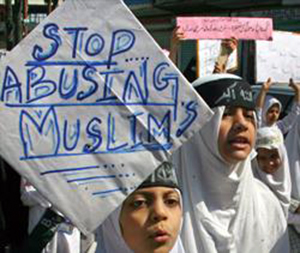Melbourne, May 11: In bias-motivated crimes, four Muslim women in Australia were allegedly punched in the face by a 39-year-old journalism student from Paraguay.
One of four Muslim women targeted in four successive and unprovoked Islamophobic attacks yesterday said she was randomly punched in the face as she walked through the city wearing her headphones.
Maria Claudia Gimenez Wilson, a 39-year-old journalism student from Paraguay, is charged with assaulting the four women, aged 18-23, as they walked along busy roads near University of Technology Sydney (UTS) in Ultimo, Sydney Morning Herald reported.
All four women were wearing hijab, and were allegedly punched in the face.
Officers are treating the assaults as "bias-motivated crimes" after Wilson allegedly told police she was motivated by a hatred of Muslims, the report said.
One of the alleged victims, Hanan Merheb, posted on Facebook that she was walking past UTS listening to music and "in a pretty good mood" when she was punched out of nowhere.
"[I was] staring absent-mindedly ahead of me when some lady ... came up to me and punched me in the face," she said.
"She didn't speak to me, didn't run away, she just punched me and walked off, as casually as if she had just come to say hello."
Wilson, who moved to Australia to study, was ordered to undergo a psychiatric assessment in Prince of Wales Hospital today after her Legal Aid solicitor, Vanya Hampel, told Central Local Court that her client was seeking to be dealt with under mental health legislation.
A medical report said that Wilson had schizoaffective disorder and "appears to be suffering persecutory beliefs".
"The only thing I did was to take a bull cut [sic] to a Muslim lady," Wilson said. "I don't see any problem with that."
Mariam Veiszadeh, founder of Islamophobia Register Australia, said Australian Muslim women in hijab often bear the brunt of Islamophobia.
"We are very concerned with the escalation of both the frequency of incidents of Islamophobia and the level of violence," she said.
New South Wales Police spokesman for bias-motivated crime, Superintendent Daniel Sullivan, said police will "fully investigate" any race-related crimes.
"We encourage anyone who suspects they have been a victim of a bias motivated crime to report it to police. If we don't know about it, we can't investigate it," he said.
The attack comes amid assaults targeting hijab-clad women in different parts of the world from the US to the UK.





Comments
Add new comment